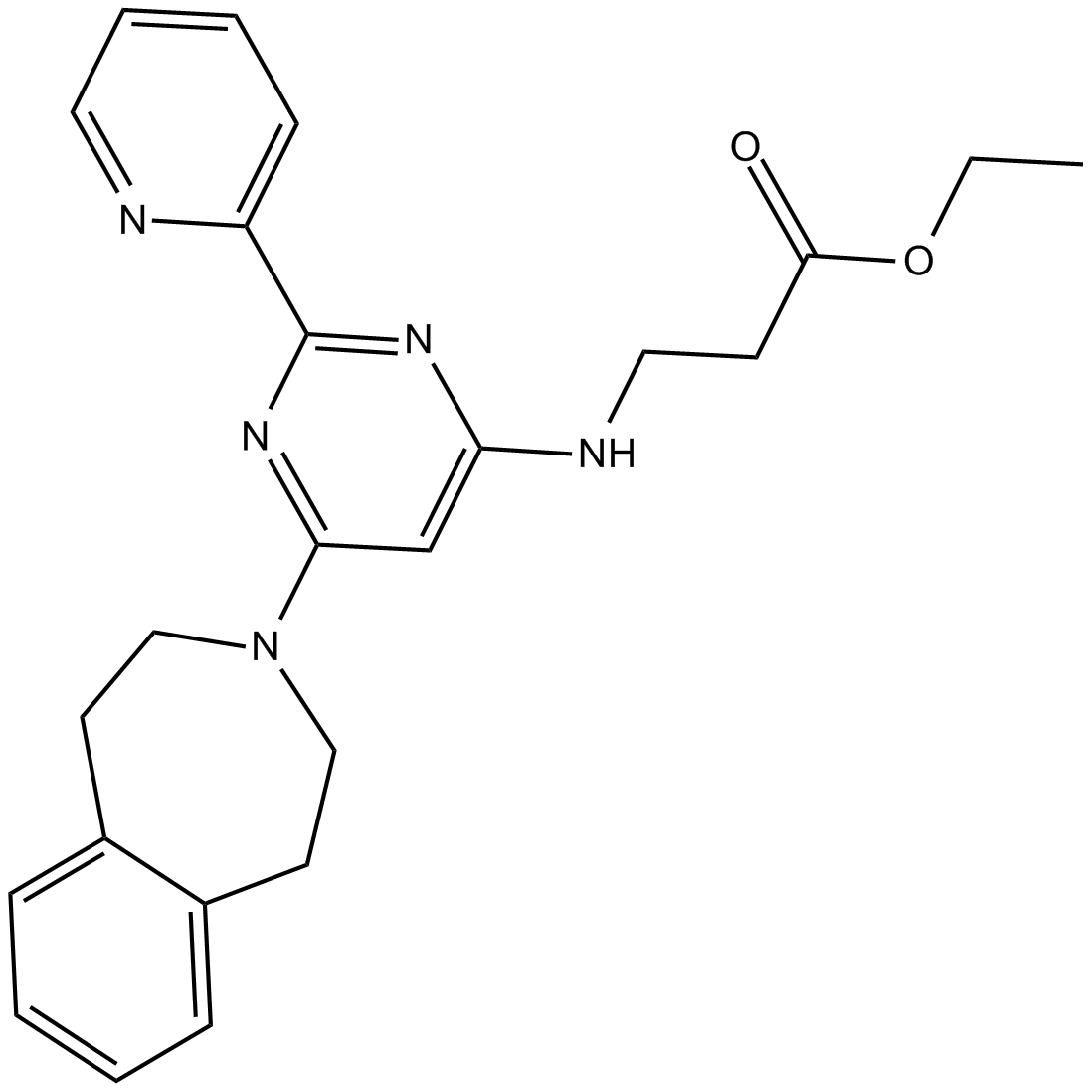GSK J4 free base |
| Catalog No.GC12997 |
GSK J4 free base is a potent dual inhibitor of H3K27me3/me2-demethylases JMJD3/KDM6B and UTX/KDM6A with IC50s of 8.6 and 6.6 μM, respectively. GSK J4 free base inhibits LPS-induced TNF-α production in human primary macrophages with an IC50 of 9 μM. GSK J4 is a cell permeable prodrug of GSK-J1. GSK J4 free base induces endoplasmic reticulum stress-related apoptosis.
Products are for research use only. Not for human use. We do not sell to patients.

Cas No.: 1373423-53-0
Sample solution is provided at 25 µL, 10mM.
GSK-J4 is a potent dual inhibitor of H3K27me3/me2-demethylases JMJD3/KDM6B and UTX/KDM6A with IC50s of 8.6 and 6.6 μM, respectively. GSK-J4 inhibits LPS-induced TNF-α production in human primary macrophages with an IC50 of 9 μM. GSK J4 is a cell permeable prodrug of GSK-J1[1][2][3].
GSK-J4 has cellular activity in Flag-JMJD3-transfected HeLa cells, in which GSK-J4 prevents the JMJD3-induced loss of nuclear H3K27me3 immunostaining. Administration of GSK-J4 increases total nuclear H3K27me3 levels in untransfected cells. GSK-J4 significantly reduces the expression of 16 of 34 LPS-driven cytokines, including tumour-necrosis factor-α (TNF-α)[1].GSK-J4 (5 μM; 48 hours) causes a more than 3-fold increase in mouse podocyte H3K27me3 content. H3K27me3 levels in cultured podocytes, GSK-J4 reduces Jagged-1 mRNA and Jagged-1 protein levels. Correspondingly, when exposed podocytes to the inducer of dedifferentiation TGF-β1, pretreatment with GSK-J4 preventes both the increase in intracellular N1-ICD levels and the increase in α-SMA and the decrease in podocin mRNA levels[2]. GSK-J4 (10, 25 nM) acts upon DCs promoting the differentiation of Treg cells, improving Treg stability and suppressive capacities, without affecting the differentiation of Th1 and Th17 cells[3].GSK-J4 inhibits JMJD3 expression that is induced by TGF-β1[4].GSK-J4 inhibits H3K4 demethylation at Xist, Nodal, and HoxC13 in female embryonic stem cells[5].
GSK-J4 Hydrochloride (10 mg/kg; i.p.; thrice-weekly for 10 weeks) attenuates the development of kidney disease in diabetic mice[2].GSK-J4 (0.5 mg/kg, i.p.) significantly reduces the severity and delays the onset of the disease of the mouse model of experimental autoimmune encephalomyelitis[3].
References:
[1]. Kruidenier L, et al. A selective jumonji H3K27 demethylase inhibitor modulates the proinflammatory macrophage response. Nature. 2012 Aug 16;488(7411):404-8.
[2]. Majumder S, et al. Shifts in podocyte histone H3K27me3 regulate mouse and human glomerular disease. J Clin Invest. 2018 Jan 2;128(1):483-499.
[3]. Donas C, et al. The histone demethylase inhibitor GSK-J4 limits inflammation through the induction of a tolerogenic phenotype on DCs. J Autoimmun. 2016 Dec;75:105-117.
[4]. Yapp C, et al. H3K27me3 demethylases regulate in vitro chondrogenesis and chondrocyte activity in osteoarthritis. Arthritis Res Ther. 2016 Jul 7;18(1):158
[5]. Kamikawa YF, et al. Histone demethylation maintains Prdm14 and Tsix expression and represses xIst in embryonic stem cells. PLoS One. 2015 May 20;10(5):e0125626
[6]. Heinemann B, et al. Inhibition of demethylases by GSK-J1/J4. Nature. 2014 Oct 2;514(7520):E1-2
Average Rating: 5 (Based on Reviews and 8 reference(s) in Google Scholar.)
GLPBIO products are for RESEARCH USE ONLY. Please make sure your review or question is research based.
Required fields are marked with *




















